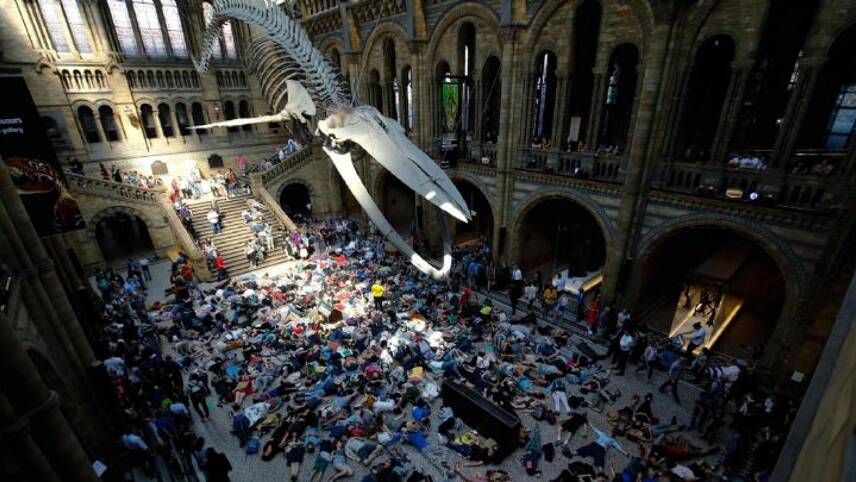Register for free and continue reading
Join our growing army of changemakers and get unlimited access to our premium content

The report comes as climate demonstrations continue across the UK. Image: Extinction Rebellion
The paper says policymakers have made a “catastrophic mistake” by underestimating the risks posed by environmental breakdown and the potential benefits of switching to a different economic approach that focuses on building abundance rather than running down resources.
“A new model is needed to rapidly create societies that are more sustainable, just and prepared: bringing human activity to within environmentally sustainable limits while narrowing inequality, improving quality of life, and becoming better prepared for the accelerating consequences of environmental breakdown,” says the discussion document by the Institute for Public Policy Research (IPPR).
The paper is a follow-up to a widely circulated IPPR study, published in February, that said a gathering storm of human-caused threats to climate, nature and economy posed a danger of systemic crash comparable to the 2008 financial crisis.
To avoid this, the document says there is an urgent need for parliament to pass a “Sustainable Economy Act” that would mandate statutory targets to rapidly reduce the effects of declining soil fertility, air quality, pollinator numbers, fish stocks, wildlife diversity and other benchmarks of a healthy environment.
The move would effectively place a full sustainability constraint on all UK economic activity, allowing natural abundance to recover for the common good instead of running it down to the detriment of all but a super-wealthy minority.
The model would be the Climate Change Act 2008, which put Britain at the forefront of efforts to ensure economic activity was aligned with goals to reduce emissions of carbon dioxide and other greenhouse gases that cause global heating. Sustainable economy legislation would go further by widening the range of targets and standards, including those relating to trade to ensure that imported goods were not only safe for human consumption in the UK, but also had a minimum environmental impact in the country of production.
his would represent a major change from the current situation in which the UK is making some progress in reducing domestic emissions even as it continues to subsidise and support fossil fuel industries overseas.
It would also be markedly more ambitious than the government’s plans for a new Environment Act because the IPPR – which is considered an influence on Labour policy – also proposes establishing a committee to regularly update goals in line with advances in scientific knowledge and creating a powerful watchdog body that would enforce the targets. Environmental groups worry that the government is planning a weak post-Brexit replacement for the EU’s strong monitoring regulations on water quality, wildlife and air pollution.
The IPPR said a sustainability act would also require measures to reduce excessive consumption, which was worsening inequality and making it harder to improve living standards. This could include changes to advertising standards, wider introduction of carbon pricing and investment in public services that encourage more sustainable, fulfilling lifestyles. It would also encourage financial markets to include environment risks in asset valuations so that unsustainable investments become prohibitively expensive.
Central banks would be asked to take a more prominent role in managing the financial risks from extreme weather and other symptoms of environmental breakdown. A new public investment bank and a network of regional development banks could fund the transition to a carbon-free economy, which would create jobs similar to the plans outlined in the “green new deals” that have been called for in the US and elsewhere.
The authors of the IPPR paper say much of this will already be necessary as a result of the UK’s recent commitment to go carbon neutral by 2050. But their proposal would go further to ensure other natural life support systems are not sacrificed in the race to salvage the climate.
“We are suggesting placing a boundary on our economy to ensure we live within our environmental means,” said Laurie Laybourn-Langton, the lead author of the report. “It is not just about the climate. Environmental breakdown might be the most complex, dangerous, difficult problem that we’ve ever faced. By its very nature, it requires ambitious, large-scale legislation.”
He acknowledges that the current trend in global politics is in the opposite direction, towards a nationalist race to run-down what is left of the world’s resources, but remains optimistic about the positive potential of a new sustainability law, particularly compared to the alternative.
“For those who want to listen to suggestions for solutions, this is roadmap,” Laybourn-Langton says. “And we think that a country doing this can unlock great benefits for society in terms of health, quality of life and a sense of a shared abundance … The actions needed to realise this will be hard, but what will be harder will be for my generation and those below me to try to live with the current set of cascading problems. Running down what we have leads to a horrendous, suicidal, self defeating spiral. A good life is where we benefit from a strong commons and not destroy those common resources.”
Jonathan Watts
This article first appeared on the Guardian
edie is part of the Guardian Environment Network


Please login or Register to leave a comment.